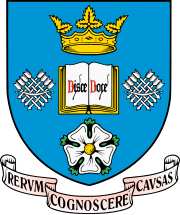
Back Universiteit van Sheffield Afrikaans جامعة شفيلد Arabic جامعة شيفيلد ARZ Şeffild Universiteti Azerbaijani شفیلد بیلیمیوردو AZB Шэфілдскі ўніверсітэт Byelorussian শেফিল্ড বিশ্ববিদ্যালয় Bengali/Bangla Universitat de Sheffield Catalan University of Sheffield CEB Univerzita v Sheffieldu Czech
 | ||||||||||||||
| Latin: Universitas Sheffieldiensis[1] | ||||||||||||||
| Motto | Latin: Rerum cognoscere causas | |||||||||||||
|---|---|---|---|---|---|---|---|---|---|---|---|---|---|---|
Motto in English | To discover the causes of things | |||||||||||||
| Type | Public research university | |||||||||||||
| Established | 1905 – University of Sheffield Predecessor institutions: 1828 – Sheffield Medical School 1879 – Firth College 1884 – Sheffield Technical School[2] 1897 – University College of Sheffield[3] | |||||||||||||
| Endowment | £47.1 million (2023)[4] | |||||||||||||
| Budget | £880.2 million (2022/23)[4] | |||||||||||||
| Chancellor | Lady Justice Rafferty | |||||||||||||
| Vice-Chancellor | Koen Lamberts[5] | |||||||||||||
Academic staff | 3,700 (2022/23)[6] | |||||||||||||
Administrative staff | 4,455 (2022/23)[6] | |||||||||||||
| Students | 31,475 (2022/23)[7] | |||||||||||||
| Undergraduates | 20,825 (2022/23)[7] | |||||||||||||
| Postgraduates | 10,655 (2022/23)[7] | |||||||||||||
| Location | , , England 53°22′51″N 1°29′20″W / 53.3807°N 1.4888°W | |||||||||||||
| Campus | Urban | |||||||||||||
| Colours | Black & gold | |||||||||||||
| Affiliations | ||||||||||||||
| Website | sheffield | |||||||||||||
 | ||||||||||||||
The University of Sheffield (informally Sheffield University[8][9] or TUOS)[10][11] is a public research university in Sheffield, South Yorkshire, England. Its history traces back to the foundation of Sheffield Medical School in 1828, Firth College in 1879 and Sheffield Technical School in 1884.[2] University College of Sheffield was subsequently formed by the amalgamation of the three institutions in 1897 and was granted a royal charter as University of Sheffield in 1905 by King Edward VII.
Sheffield is formed from 50 academic departments which are organised into five faculties and an international faculty. The annual income of the institution for 2022–23 was £880.2 million, of which £198.6 million was from research grants and contracts, with an expenditure of £790.5 million.[4]
The university is one of the original red brick universities and a founding member of the Russell Group. It is also part of the Worldwide Universities Network, the N8 Group of the eight most research intensive universities in Northern England and the White Rose University Consortium. Sheffield has been ranked in between 66th and 104th best university in the world by QS for the last fifteen years.[12] ARWU ranked Sheffield 9th overall in the UK[13] and THE ranked the university 22nd in Europe for teaching excellence.[14][15] According to the latest Research Excellence Framework 2021, Sheffield is ranked 11th in the UK for research power calculated by multiplying the institution's GPA by the total number of full-time equivalent staff submitted.[16]
There are six Nobel laureates affiliated with Sheffield, as either the alumni or former long-term staff of the university.[17] They are contributors to the development of penicillin, the discovery of the citric acid cycle, the investigation of high-speed chemical reactions, the discovery of introns in eukaryotic DNA, the discovery of fullerene, and the development of molecular machines. Alumni also include several heads of state, Home Secretaries, Court of Appeal judges, Booker Prize winners, astronauts and Olympic gold medallists.
- ^ Anderson, Peter John (1907). Record of the Celebration of the Quatercentenary of the University of Aberdeen: From 25th to 28th September, 1906. Aberdeen, United Kingdom: Aberdeen University Press (University of Aberdeen). ASIN B001PK7B5G. ISBN 9781363625079.
- ^ a b Mathers, Helen (2005). Steel City Scholars, The Centenary History of the University of Sheffield. James and James. p. 191. ISBN 1-904022-01-4.
- ^ "Royal Charter" (PDF). Charter of Incorporation. Archived (PDF) from the original on 3 March 2021. Retrieved 29 August 2020.
- ^ a b c "Annual Report and Financial Statements 2022–23". The University of Sheffield. Retrieved 8 December 2023.
- ^ Blackledge, Richard (26 June 2018). "Sheffield University appoints new vice-chancellor". The Star. Archived from the original on 6 December 2018. Retrieved 6 December 2018.
- ^ a b "Who's working in HE?". www.hesa.ac.uk. Higher Education Statistics Agency.
- ^ a b c "Where do HE students study? | HESA". hesa.ac.uk. Higher Education Statistics Agency.
- ^ "Overseas students 'worth £120m to Sheffield'". BBC News. BBC. Archived from the original on 8 March 2021. Retrieved 22 August 2020.
- ^ "The 10 best universities to study politics". The Telegraph. Archived from the original on 12 January 2022. Retrieved 22 August 2020.
- ^ "The University of Sheffield (TUOS) Approach to Benefits Management and Realisation (Executive Summary)" (PDF). Strategic Change Office. The University of Sheffield. Archived (PDF) from the original on 21 May 2022. Retrieved 28 August 2020.
- ^ "TUOS Referencing standards". Information and Digital Literacy Tutorials. The University of Sheffield. 8 December 2021. Archived from the original on 29 July 2020. Retrieved 28 August 2020.
- ^ "The University of Sheffield". Top Universities. Archived from the original on 28 August 2020. Retrieved 12 September 2020.
- ^ "ShanghaiRanking's Academic Ranking of World Universities".
- ^ "University of Sheffield praised for teaching excellence". Where Women Work. Archived from the original on 27 September 2020. Retrieved 7 September 2020.
- ^ "Europe Teaching Rankings 2019". Times Higher Education (THE). 27 June 2019. Archived from the original on 20 April 2021. Retrieved 29 September 2021.
- ^ "REF 2021: Quality ratings hit new high in expanded assessment". 12 May 2022. Archived from the original on 14 June 2022. Retrieved 7 June 2022.
- ^ "Nobel Prize winners associated with the University". University of Sheffield. Archived from the original on 13 October 2016. Retrieved 23 February 2016.